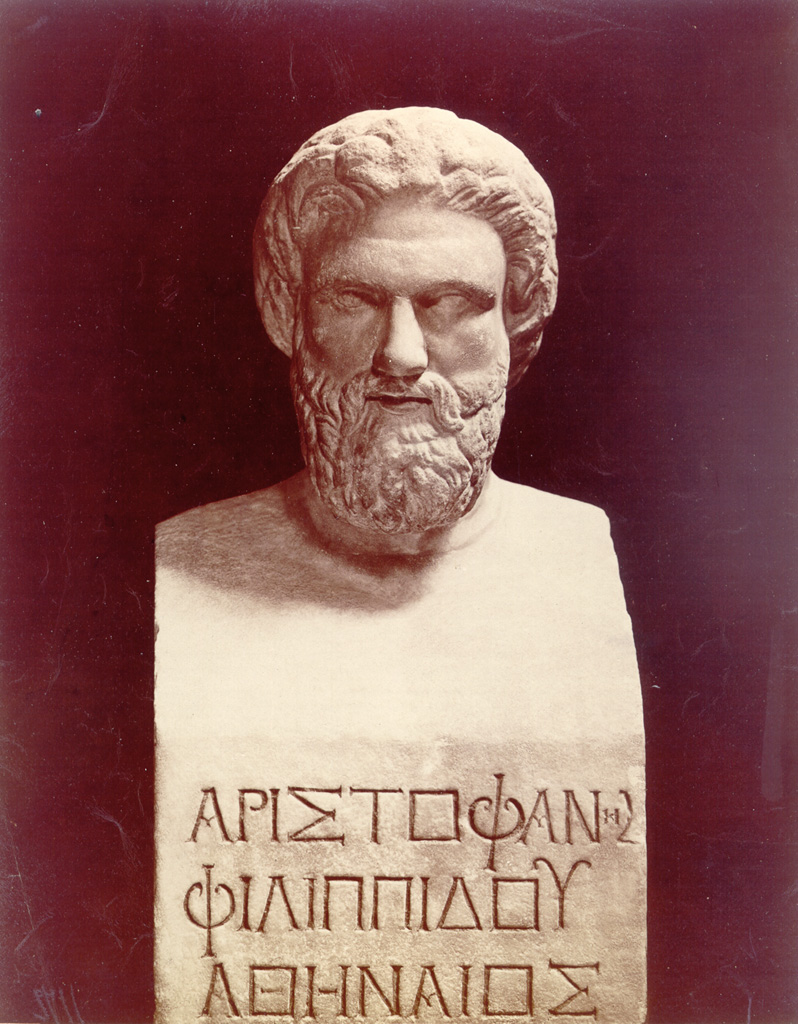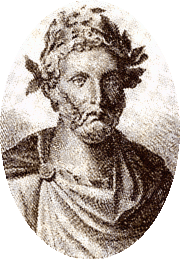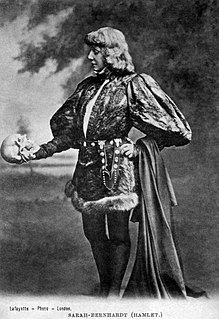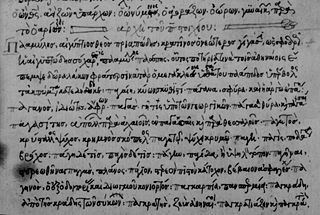
Aristophanes, son of Philippus, of the deme Kydathenaion, was a comic playwright of ancient Athens. Eleven of his forty plays survive virtually complete. These provide the most valuable examples of a genre of comic drama known as Old Comedy and are used to define it, along with fragments from dozens of lost plays by Aristophanes and his contemporaries.

Classics or classical studies is the study of classical antiquity. It encompasses the study of the Greco-Roman world, particularly of its languages and literature but also of Greco-Roman philosophy, history, and archaeology. Traditionally in the West, the study of the Greek and Roman classics was considered one of the cornerstones of the humanities and a fundamental element of a rounded education. The study of classics has therefore traditionally been a cornerstone of a typical elite education.

Titus Maccius Plautus, commonly known as Plautus, was a Roman playwright of the Old Latin period. His comedies are the earliest Latin literary works to have survived in their entirety. He wrote Palliata comoedia, the genre devised by the innovator of Latin literature, Livius Andronicus. The word Plautine refers to both Plautus's own works and works similar to or influenced by his.
Greek literature dates from ancient Greek literature, beginning in 800 BC, to the modern Greek literature of today.
MEGA Channel, also known as MEGA TV or just MEGA, was a television network in Greece, that broadcast a mix of foreign and Greek programming. Teletipos S.A. was founded in 1989 under the name Teletype Television Programmes S.A. and the trade name MEGA CHANNEL. It was the first private television station in Greece, launched on air on November 20, 1989.

A literary genre is a category of literary composition. Genres may be determined by literary technique, tone, content, or even length. The distinctions between genres and categories are flexible and loosely defined, often with subgroups.

The ancient Greek drama was a theatrical culture that flourished in ancient Greece from 700 BC. The city-state of Athens, which became a significant cultural, political, and military power during this period, was its center, where it was institutionalised as part of a festival called the Dionysia, which honored the god Dionysus. Tragedy, comedy, and the satyr play were the three dramatic genres to emerge there. Athens exported the festival to its numerous colonies.
The comedy of manners also called anti sentimental comedy is a form of comedy that satirizes the manners and affectations of contemporary society and questions societal standards. Social class stereotypes are often represented through stock characters such as the miles gloriosus in ancient Greek comedy or the fop and rake of English Restoration comedy, which is sometimes used as a synonym for "comedy of manners". A comedy of manners often sacrifices the plot, which usually centers on some scandal, to witty dialogue and sharp social commentary. Oscar Wilde's play, The Importance of Being Earnest (1895), which satirized the Victorian morality of the time, is one of the best-known plays of this genre.

Ancient Greek comedy was one of the final three principal dramatic forms in the theatre of classical Greece. Athenian comedy is conventionally divided into three periods: Old Comedy, Middle Comedy, and New Comedy. Old Comedy survives today largely in the form of the eleven surviving plays of Aristophanes, while Middle Comedy is largely lost, i.e. preserved only in relatively short fragments by authors such as Athenaeus of Naucratis. New Comedy is known primarily from the substantial papyrus fragments of Menander.

The history of Latin poetry can be understood as the adaptation of Greek models. The verse comedies of Plautus are considered the earliest surviving examples of Latin literature and are estimated to have been composed around 205-184 BC.

Theatre of ancient Rome refers to the time period of theatrical practice and performance in Rome beginning in the 4th century B.C., following the state’s transition from Monarchy to Republic. Theatre of the era is generally separated into the genres of tragedy and comedy. Some works by Plautus, Terence, and Seneca the Younger survive to this day. Eventually, theatre would represent an important aspect of Roman society because it would come to function as the primary means through which the Roman people could express their political emotions during the republican and imperial periods of Rome.
A comedy is entertainment consisting of jokes intended to make an audience laugh.<ruf name = OED/> For ancient Greeks and Romans a comedy was a stage-play with a happy ending. In the Middle Ages, the term expanded to include narrative poems with happy endings and a lighter tone. In this sense Dante used the term in the title of his poem, the Divine Comedy.

Drama is the specific mode of fiction represented in performance: a play, opera, mime, ballet, etc, performed in a theatre, or on radio or television. Considered as a genre of poetry in general, the dramatic mode has been contrasted with the epic and the lyrical modes ever since Aristotle's Poetics —the earliest work of dramatic theory.

Theatre or theater is a collaborative form of fine art that uses live performers, typically actors or actresses, to present the experience of a real or imagined event before a live audience in a specific place, often a stage. The performers may communicate this experience to the audience through combinations of gesture, speech, song, music, and dance. Elements of art, such as painted scenery and stagecraft such as lighting are used to enhance the physicality, presence and immediacy of the experience. The specific place of the performance is also named by the word "theatre" as derived from the Ancient Greek θέατρον, itself from θεάομαι.

In a modern sense, comedy refers to any discourse or work generally intended to be humorous or amusing by inducing laughter, especially in theatre, television, film, stand-up comedy, or any other medium of entertainment. The origins of the term are found in Ancient Greece. In the Athenian democracy, the public opinion of voters was influenced by the political satire performed by the comic poets at the theaters. The theatrical genre of Greek comedy can be described as a dramatic performance which pits two groups or societies against each other in an amusing agon or conflict. Northrop Frye depicted these two opposing sides as a "Society of Youth" and a "Society of the Old." A revised view characterizes the essential agon of comedy as a struggle between a relatively powerless youth and the societal conventions that pose obstacles to his hopes. In this struggle, the youth is understood to be constrained by his lack of social authority, and is left with little choice but to take recourse in ruses which engender very dramatic irony which provokes laughter.

A play is a form of literature written by a playwright, usually consisting of dialogue and singing between characters, intended for theatrical performance rather than just reading. Plays are performed at a variety of levels, from Broadway, Off-Broadway, regional theater, to Community theatre, as well as university or school productions. There are rare dramatists, notably George Bernard Shaw, who have had little preference as to whether their plays were performed or read. The term "play" can refer to both the written texts of playwrights and to their complete theatrical performance.

Jason Mantzoukas is an American comedic actor best known for his recurring roles as Rafi in the FX comedy series The League and Nuclear Nadal in The Dictator.











